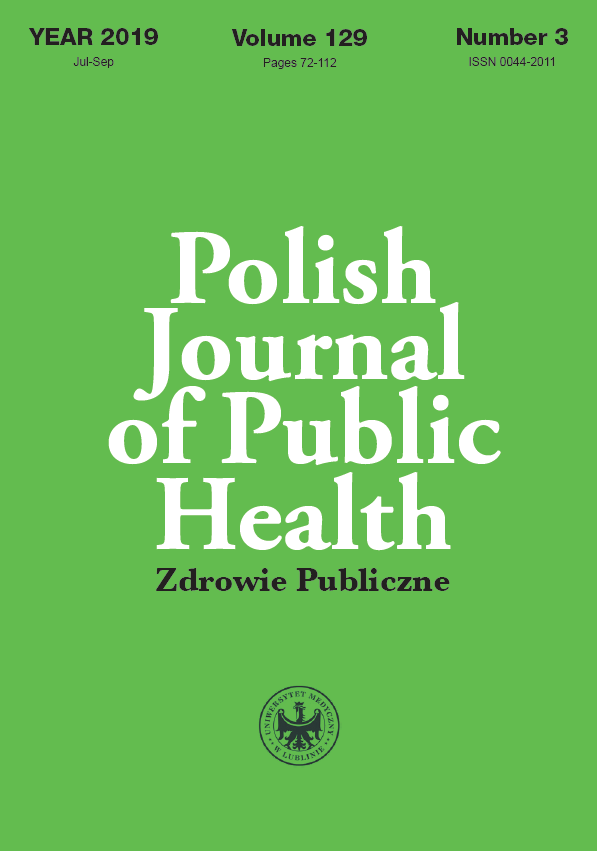Attitudes of students of nursing major towards people of geriatric age
DOI:
https://doi.org/10.2478/pjph-2019-0022Keywords:
old age, geriatric patient, attitudeAbstract
Introduction. Geriatric age is a natural stage of human ontogenesis, which is usually characterized by a decrease in overall efficiency, increased degradation of mental and physical functions.
Aim. Assessment of attitudes of students of nursing major towards people of geriatric age.
Material and methods. The study covered 202 students of nursing major; a diagnostic survey using own survey questionnaire.
Results. Students declared that they were treating elder people with respect and kindness, they pointed to a positive image of the elderly person, however associated the phenomenon of ageing with disability and diseases. Unfortunately, almost half of the respondents would not like to work with elderly people in the future. Most of the respondents declare helping elderly people – these were younger people as well as people living with seniors. Nearly half of the respondents would not allow their loved ones to be taken to a special facility even if they had a severe illness and most often it related to people who have elderly people in their surroundings.
Conclusions. The majority of respondents shows positive attitudes towards people of geriatric age and points to their positive image, while the majority of respondents associates old age in a negative way. Nearly half of the respondents would not like to work with elderly people in the future. Nearly half of the respondents would not allow a loved person to be taken to a special facility even if they had a severe illness and a significant proportion of respondents help elderly people.
References
1. Błędowski P, Dzięgielewska M, Szatur-Jaworska B. Podstawy gerontologii społecznej. Warszawa: Oficyna Wydawnicza ASPRA-JR; 2006.
2. Central Statistical Office. Warszawa: Department of Demographic and Labor Market Research; 2014.
3. Gutowska A. (Nie)pełnosprawna starość– przyczyny, uwarunkowania, wsparcie. Interdyscyplinarne Konteksty Pedagogiki Specjalnej. Poznań 2015; 8: 9–33.
4. Nicole-Urbanowicz J. Ageizm i dyskryminacja ze względu na wiek. Niebieska Linia. 2006;46:6-9.
5. Nowak S. Teorie postaw. Warszawa: PWN; 1973.
6. Soborski W. Postawy ich badanie i kształtowanie. Kraków: Wydawnictwo Naukowe WSP; 1987.
7. Sendyk M. Osoby starsze w roli dziadków. Nowicka A. Wybrane problemy osób starszych. Kraków: Oficyna Wydawnicza Impuls; 2006.
8. Majda A, Nawalana A, Wojcieszek A. Postawy ludzi uzupełniających wykształcenie średnie wobec osób starszych. Probl Pielęg. 2013;21(4):496-503.
9. Kołpa M, Łabuzem M, Lipińska M. Postawy studentów licencjackich studiów pielęgniarskich wobec osób starszych. Pielęg XXI w. 2005;3(12):141-7.
10. Świderska M, Kapszewicz P. Stereotypy dotyczące starzenia się i ludzi starszych w opiniach studentów medycyny. Pedag Rodz. 2015;5/4:185-99.
11. Central Statistical Office; 2011.
12. Dobrowolska B, Jędrzejkiewicz B. Wybrane aspekty opieki geriatrycznej w opinii osób starszych oraz studentów medycyny i pielęgniarstwa w kontekście dyskusji na temat ageizmu w sektorze opieki zdrowotnej. Gerontol Pol. 2015;4:165-70.
13. Bojanowska E. Opieka nad ludźmi starymi. To idzie starość – polityka społeczna wobec procesu starzenia się ludności w Polsce. Praca naukowo-badawcza przygotowana przez Zespół Ekspertów Fundacji Instytut Spraw Publicznych na zlecenie Zakładu Ubezpieczeń Społecznych. Warszawa; 2008.
14. Zrałek M. Kształtowanie środowiska zamieszkania sprzyjającego aktywnemu starzeniu się. Aktywne starzenie się – Przeciwdziałanie barierom. Łódź: Wydawnictwo Uniwersytetu Łódzkiego; 2014.
Downloads
Published
Issue
Section
License
Copyright (c) 2020 Polish Journal of Public Health

This work is licensed under a Creative Commons Attribution-NonCommercial-NoDerivatives 3.0 Unported License.


